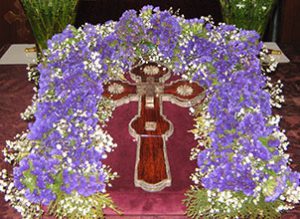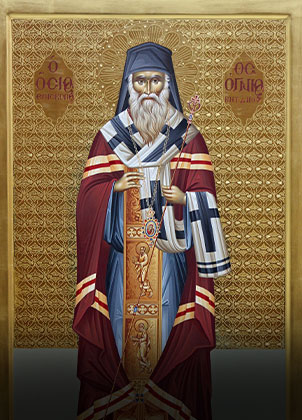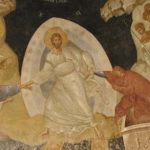Во имя Отца и Сына и Св. Духа.
Мы сегодня вспоминаем братьев Маккавеев, их матерь Соломонию и учителя старца Елиазара. Они были мученики Ветхого Завета – «прежде мучеников, превеликие мученики», как сказано в их кондаке.
В то время (во 2-м веке до Рождества Христова) Иудея находилась под властью Антиохийского царства. Царь Антиох Епифан разослал по всему царству указ, чтобы все его подданные исповедовали одних и тех же греческих богов и держались одних и тех же греческих законов. Он поставил своей целью установить в Иудее греческие языческие обычаи и искоренить почитание Истинного Бога. Антиох приказал установить в Иерусалимском храме статую бога Зевса и принес ему в жертву свинью.
В то время были схвачены 7 юношей с их матерью и их учитель старец Елеазар. Всем им было приказано есть свиное мясо, запрещенное Моисеевым Законом. Когда они отказались сделать это, их подвергли немыслимым пыткам.
Первым пострадал старец Елеазар замученный в Иерусалиме. Царь Антиох сам допрашивал юношей в Антиохии, но никакие уговоры, ни обещания, ни угрозы не смогли победить твердость их духа. Братья все были замучены, один за другим, начиная со старшего до седьмого. Когда все были убиты, кроме младшего, царь, надеясь склонить его на свою сторону, приказал матери уговорить сына подчиниться царю. Но мужественная мать, напротив, умоляла сына последовать примеру братьев.
По-гречески слово «мученик» “μάρτυς ” значит – свидетель. Потому что мученики своей готовностью умереть за Бога и Его закон свидетельствовали, что есть другая несравненно лучшая жизнь, которую они получат после мучений и смерти.
Один из братьев Маккавеев так отвечал царю: «Ты, мучитель, лишаешь нас настоящей жизни, но Царь мира воскресит нас, умерших за Его Законы, для жизни вечной». (2 Мак. 7, 9)
Знаменательно, что память мучеников Маккавеев, которые предпочли лучше умереть, чем нарушить закон Божий о воздержании от непозволительной пищи, положена в первый день поста, как пример для нас.
Есть и христианские мученики, пострадавшие за церковные законоположения о посте. Например св. муч. Виленские, Антоний, Иоанн и Евстафий, замученные за отказ есть мясо во время поста.
Соблюдение установленных Церковью постов приносит духовную пользу не только тем, что обуздывает тело, но и тем, что приучает к послушанию церковным уставам. А послушание – это прямой путь к смирению.
Св. Кассиан (5 в.) рассказывает о происшествии, случившемся в египетском монастыре в его время. Настоятель послал двух мальчиков-послушников отнести корзину фруктов старым монахам, подвизавшимся в пустыне недалеко от монастыря. Мальчики, идя по пустыне к отшельникам, заблудились и умерли от палящего солнца, голода и жажды. Когда монахи нашли их тела спустя несколько дней, они увидели, что фрукты, которые они несли, остались несъеденными.
Этот случай произвел большое впечатление на многих, как удивительный пример послушания до смерти, – а именно то, что мальчики не считали для себя позволительным съесть плоды, которые даны были им для передачи старцам. Они предпочли лучше умереть, чем нарушить данную им заповедь.
Может быть, в наше время такой поступок покажется странным и неразумным. Ведь настоятель не мог предвидеть, что мальчики окажутся в беде, иначе он, конечно, дал бы им благословение съесть эти плоды. И кроме того, плоды все равно погибли и не были доставлены отшельникам.
Однако, эти мальчики не думали ничего подобного, потому что не слишком ценили эту временную жизнь и не ставили ее выше духовных, непреходящих ценностей, как например, добродетель послушания.
Потому они и оставили нам такой пример самоотвержения, которому мы удивляемся 16 веков спустя. Самоотвержение ни в чем так не проявляется, как в обуздании пожеланий тела.
Мы, по нашей немощности не можем подражать святым в их подвигах, но можем и должны по нашей силе брать с них пример, прославлять их, и сравнивая свою жизнь с их подвигами, познавать свою немощность и смиряться.
Аминь
In the name of the Father and of the Son and of the Holy Spirit.
Today we celebrate the memory of the Seven Maccabean brothers, their mother Solomonia and their teacher elder Eliazar. They were martyrs of the Old Testament – “who before the martyrs, were martyrs most great”, as mentioned in their kontakion.
At that time (2nd century BC) Judea was under the rule of the kingdom of Antioch. King Antiochus Epiphanes issued a decree throughout his kingdom forcing all his subjects to worship the Greek gods and to adhere to Greek customs. His aim was to eradicate the worship of the One True God and establish Greek customs in Judea. Antiochus ordered a statue of the god Zeus to be erected in the Jerusalem temple and brought a pig to him as a sacrifice.
At that time, 7 youths with their mother and their teacher Eleazar were seized. They were all ordered to eat pork that was forbidden by the Law of Moses. When they refused, they were all subjected to unimaginable torture.
The first to suffer was the elder Eleazar: tortured to death in Jerusalem.
The king personally interrogated the youths in Antioch, but no amount of flattery, promises and threats couldn’t defeat their resolute faith. All the brothers were tortured to death one after another, beginning with the eldest down to the seventh youth. After six older brothers were killed, except the youngest, the king attempted to entice him to his side and ordered his mother to convince her son to submit to the King. However, contrary to the request, the fearless mother pleaded her son to follow his brothers’ example.
In Greek, the word “martyr” (μάρτυς) means – a witness, because the martyrs’ willingness to die for God and His laws, bore witness that there was another incomparably better life which they would receive after their suffering and death.
One of the Maccabean brothers said to the king: “You accursed wretch, you dismiss us from this present life, but the King of the world will raise us up to an everlasting renewal of life, because we have died for his laws.” (2 Macc. 7,9)
It’s noteworthy that the commemoration of the Maccabean Martyrs, who preferred death rather than violate God’s law of abstinence from forbidden food, is designated on the first day of Dormition Lent as an example to us.
There are other Christian martyrs who suffered for the Church’s laws on fasting. For example, Holy Martyrs of Vilnius: Anthony, John and Eustathius, tortured to death for refusing to eat meat during Lent.
The observance of the fasts established by the Church brings spiritual benefits not only through controlling the desires of the body, but also by teaching one to obey the Church rules. And obedience is a direct path to humility.
Saint Cassian (5th century) relates about an incident that occurred in a monastery in Egypt during his time. The abbot sent two novices, very young boys, to deliver a basket of fruit to the old hermits who lived in the desert not far from the monastery. In going to the hermits through the desert, the boys got lost and subsequently died from the scorching sun, exhaustion and dehydration.
When the monks found their bodies a few days later, they found that the fruit the boys were carrying was not touched. This happening created a great impression upon many as an amazing example of obedience unto death – namely, that the boys did not consider it permissible for themselves to eat the fruit that was given to them for delivery to the hermits. They preferred better to die than violate the commandment given them.
Perhaps in our time this act would seem strange and irrational. After all, the abbot could not foresee that the boys would encounter these difficulties, otherwise he would, of course, had given them his blessing to eat the fruit. And apart from this, the fruit had gone bad anyway and didn’t reach the elders.
However, these young novices didn’t think along these lines, because they didn’t very much cherish this temporary life and didn’t regard it as higher than the spiritual, imperishable values such as virtue of obedience.
Thus, they left us such an amazing example of self-denial, which we marvel at 16 centuries later. Self-denial does not manifest itself in anything as much as in cutting off the desires of the body.
We, being weak, cannot imitate the exploits of the saints, but we can and must, to the measure of our strength, embrace their example, glorify them, and, comparing our lives with their exploits, recognise our weakness and humble ourselves.
Amen









